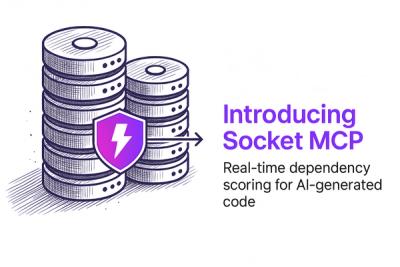
Product
Secure Your AI-Generated Code with Socket MCP
Socket MCP brings real-time security checks to AI-generated code, helping developers catch risky dependencies before they enter the codebase.
master_slave_adapter
Advanced tools

Improved version of the master_slave_adapter plugin, packaged as a gem.
with_consistencywith_master, with_slaveon_commit, on_rollbackThe adapter will run all reads against a slave database, unless a) the read is inside an open transaction or b) the adapter determines that the slave lags behind the master relative to the last write. For this to work, an initial initial consistency requirement, a Clock, must be passed to the adapter. Based on this clock value, the adapter determines if a (randomly chosen) slave meets this requirement. If not, all statements are executed against master, otherwise, the slave connection is used until either a transaction is opened or a write occurs. After a successful write or transaction, the adapter determines a new consistency requirement, which is returned and can be used for subsequent operations. Note that after a write or transaction, the adapter keeps using the master connection.
As an example, a Rails application could run the following function as an around_filter:
def with_consistency_filter
if logged_in?
clock = cached_clock_for(current_user)
new_clock = ActiveRecord::Base.with_consistency(clock) do
# inside the controller, ActiveRecord models can be used just as normal.
# The adapter will take care of choosing the right connection.
yield
end
[ new_clock, clock ].compact.max.tap do |c|
cache_clock_for(current_user, c)
end if new_clock != clock
else
# anonymous users will have to wait until the slaves have caught up
with_slave { yield }
end
end
Note that we use the last seen consistency for a given user as reference point. This will give the user a recent view of the data,
possibly reading from master, and if no write occurs inside the with_consistency block, we have a reasonable value to
cache and reuse on subsequent requests.
If no cached clock is available, this indicates that no particular consistency is required. Any slave connection will do.
Since with_consistency blocks can be nested, the controller code could later decide to require a more recent view on
the data.
See also this blog post for a more detailed explanation.
The original functionality of the adapter has been preserved:
ActiveRecord::Base.with_master do
# everything inside here will go to master
end
ActiveRecord::Base.with_slave do
# everything inside here will go to one of the slaves
# opening a transaction or writing will switch to master
# for the rest of the block
end
with_master, with_slave as well as with_consistency can be nested deliberately.
Due to scenarios when the master is possibly down (e.g., maintenance), we try to delegate as much as possible to the active slaves. In order to accomplish this we have added the following functionalities.
This feature was originally developed at SoundCloud for the standard MysqlAdapter. It allows arbitrary blocks of
code to be deferred for execution until the next transaction completes (or rolls back).
irb> ActiveRecord::Base.on_commit { puts "COMMITTED!" }
irb> ActiveRecord::Base.on_rollback { puts "ROLLED BACK!" }
irb> ActiveRecord::Base.connection.transaction do
irb* # ...
irb> end
COMMITTED!
=> nil
irb> ActiveRecord::Base.connection.transaction do
irb* # ...
irb* raise "failed operation"
irb> end
ROLLED BACK!
# stack trace omitted
=> nil
Note that a transaction callback will be fired only once, so you might want to do:
class MyModel
after_save do
connection.on_commit do
# ...
end
end
end
The adapter keeps a list of slave connections (see Configuration) and chooses randomly between them. The selection is
made at the beginning of a with_slave or with_consistency block and doesn't change until the block returns. Hence, a
nested with_slave or with_consistency might run against a different slave.
At SoundCloud, we're using database_cleaner's 'truncation strategy' to wipe the database between cucumber
'feature's. As our cucumber suite proved valuable while testing the with_consistency feature, we had to support
truncate_table as an ActiveRecord::Base.connection instance method. We might add other strategies if there's enough
interest.
MasterSlaveAdapter requires ActiveRecord with a version >= 2.3, is compatible with at least Ruby 1.8.7, 1.9.2, 1.9.3 and comes with built-in support for mysql and mysql2 libraries.
You can check the versions it's tested against at Travis CI.
Using plain rubygems:
$ gem install master_slave_adapter
Using bundler, just include it in your Gemfile:
gem 'master_slave_adapter'
Example configuration for the development environment in database.yml:
development:
adapter: master_slave # use master_slave adapter
connection_adapter: mysql # actual adapter to use (only mysql is supported atm)
disable_connection_test: false # when an instance is checked out from the connection pool,
# we check if the connections are still alive, reconnecting if necessary
# these values are picked up as defaults in the 'master' and 'slaves' sections:
database: aweapp_development
username: aweappuser
password: s3cr3t
master:
host: masterhost
username: readwrite_user # override default value
slaves:
- host: slave01
- host: slave02
You can execute all tests against your current ruby version via:
rake spec
In case you have rvm installed, you can test against 1.8.7, 1.9.2 and 1.9.3 as well as ActiveRecord 2 and 3 via:
bash spec/all.sh
FAQs
Unknown package
We found that master_slave_adapter demonstrated a not healthy version release cadence and project activity because the last version was released a year ago. It has 7 open source maintainers collaborating on the project.
Did you know?

Socket for GitHub automatically highlights issues in each pull request and monitors the health of all your open source dependencies. Discover the contents of your packages and block harmful activity before you install or update your dependencies.

Product
Socket MCP brings real-time security checks to AI-generated code, helping developers catch risky dependencies before they enter the codebase.

Security News
As vulnerability data bottlenecks grow, the federal government is formally investigating NIST’s handling of the National Vulnerability Database.

Research
Security News
Socket’s Threat Research Team has uncovered 60 npm packages using post-install scripts to silently exfiltrate hostnames, IP addresses, DNS servers, and user directories to a Discord-controlled endpoint.